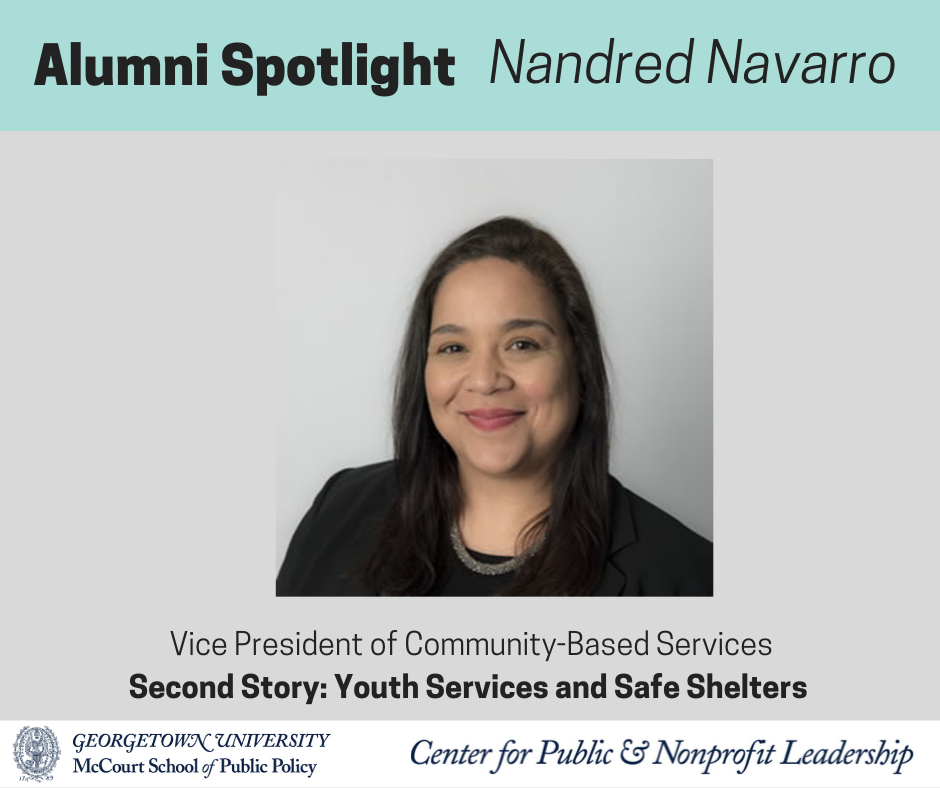Alumni Spotlight: Nandred Navarro, Second Story

Posted in News Story Spotlight
Second Story, formerly Alternative House, is a nonprofit designed to support at-risk children, youth, and families. The organization’s primary programs include Second Story for Teens in Crisis, Second Story for Young Mothers, Second Story for Homeless Youth, and Second Story in the Community.
The Center for Public and Nonprofit Leadership spoke with alumna Nandred Navarro, Director of Community-Based Services at Second Story, about her experiences working in the nonprofit sector and her time in CPNL’s Nonprofit Management Executive Certificate Program, where she was a recipient of a scholarship from the Crimsonbridge Leadership Fund.
CPNL: With so many great causes to champion within the nonprofit sector, what drew you to work at Second Story?
Navarro: Being an immigrant myself and having arrived to the United States when I was 19 years old made me develop a passion for helping youth in need of support and mentoring. I served in AmeriCorps National Service. There, I saw an opportunity to connect and help others, especially people who shared my personal experiences. I was inspired by the idea of social work. I began my journey at the Latin American Youth Center in Washington D.C. about twenty years ago. I helped tutor junior high school students and assisted the ESOL students inside their classrooms. After completing AmeriCorps, I was hired as the Center’s Teen Health Promoter Coordinator. It was really fulfilling work and I got the chance to educate and train teens to later share health information with their peers. After that, I completed my bachelor’s degree in social work and spent time mobilizing care for elderly community members before being hired by what was then Alternative House as a youth supervisor. Now, I’ve been Vice President of Community-Based Services for over a decade. Since then, we’ve really expanded, and as hectic as the field can be, I am still so grateful to be doing this work.
CPNL: Second Story offers support to a range of populations from teen moms in crisis to homeless youth. How does this impact your operations? Why do you think it’s so important to address so many communities at once?
Navarro: When you work with youth in the nonprofit sector, it becomes clear that offering only one social program wouldn’t be enough. Young people need multi-faceted, multi-staged assistance in order to really thrive. If the family needs help, we have the resources to help them and the young person. If there is an immediate crisis, we have emergency shelters available, as well as long-term lodging for as long as it’s needed. If we have a young person who is a parent, we have several programs and groups there to support them as well. At Second Story, our idea is to push for continuous assistance to make sure they are able to thrive.
CPNL: What is one significant challenge you faced as a leader in the nonprofit sector?
One of the roadblocks we find in the nonprofit sector is when a client cannot qualify for a specific resource due to the eligibility requirements. Our organization is so fortunate to have a great network of service providers that we work with. Sharing these resources alleviate this challenge but there is still the constant struggle to serve those that face some limitations when it comes to eligibility.
CPNL: How has the certificate program helped you in your career?
Navarro: There’s a lot to learn as you work within the nonprofit sector. To study somewhere and break down the elements of the sector from different perspectives alongside people just as passionate as yourself is powerful. It’s sometimes easy to think your organization is the only one having certain problems or using certain strategies, but the Certificate Program really connects you to the common experiences that come with making important changes. It was also really inspiring to meet so many people representing other amazing nonprofits.
CPNL: What advice would you give to other professionals who are considering participating in the certificate program?
Navarro: Don’t think about participating, just participate! If you’re someone who wants to work in the field, it’s a great program. It takes real effort and study to understand the amount of work that it requires, not just to do readings and show up. Part of the real value is to think critically of your own work and what you’re doing and use breaks and networking opportunities to learn from others.
This article has been lightly edited for clarity.
